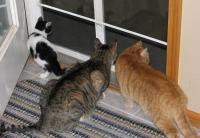Why Cats Meow
Some cats are natural talkers and meow about everything. Siamese cats, especially, have a reputation for being talkative. If you want a quiet cat, stay away from the Oriental breeds. Other cats are naturally quiet and only meow when it’s really important.
Kittens meow to their mother when they are cold or hungry. Older cats will growl, hiss, and yowl at each other, but they save meowing just for humans. This is probably because meowing gets people to do what cats want. Your cat can train you quite well!
Greeting or attention
Cats meow for various reasons and cat parents often learn exactly what their cats are saying.
Some cats do it when they greet you. It is their version of “Hello, it’s nice to see you." Though I’m sure some cats add, “It’s about time. What are you going to do for me?”
Cats may also meow just to get attention. They may want you to stop what you are doing and give them a tummy rub or some other variation. Some just want you to get a mouse to throw for them.
Feed me!
Cats often meow for food. They quickly learn that meowing near the food bowl often brings dinner or a treat.
Your cat meowing may awaken you long before your alarm goes off. This is usually because you are not getting up early enough to meet her needs.
It may be because she wants her breakfast or just wants some company.
In or out
Cats that go outside will often meow to let you know that it’s time for you to act as doorman and let her either in or out. You can resolve this problem by installing a cat door.
Cats that aren’t spayed or neutered will often yowl to find a mate. Surgery is the easy fix for this problem.
As you can see, cats meow to get what they want. They learn that humans tend to respond to meows, and they use that knowledge to their full advantage.
Medical problem
An important point is that a meow can also indicate a problem. It may be something as simple as being locked in a closet or an empty water bowl.
However, some cats may meow more if they are anxious or under stress. Others will do it when they are in pain.
If your cat is elderly, it may a medical problem that is causing your cat to meow more.
Any increase or change in meowing is a reason for a trip to your vet. You want to make sure there are no health problems before trying to control the meowing.
Steps to take
If your cat is more chatty than you like, you can try to reduce the amount of meowing. Keep in mind that you may not be able to eliminate the noise, and it will take some time and effort on your part.
With the exception of greeting you, your cat is usually meowing to get something from you. The first thing you need to do is figure out what that is. To complicate it, there may be several reasons for the meowing.
To control the meowing, you need to stop giving her what she wants. This is the hard part for people because you must be very consistent and never give in.
Ignore her when she’s meowing and reinforce quiet behavior. Pay attention to her and feed her only when she’s quiet. An automatic feeder may help if food is the main trigger.
Remember, if you give in once or twice, she quickly learns that all she has to do is meow longer or harder and it works!
All articles are reviewed and maintained by whiskerDocs team of veterinary experts.




